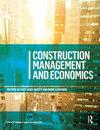Blueprinting construction logistics services for quality improvement
IF 3
Q2 BUSINESS
引用次数: 2
Abstract
Abstract Construction logistics services can, if implemented with high quality, positively impact both efficiency and sustainability of construction projects. However, present quality management frameworks have not been developed for temporary multi-actor contexts, such as construction, which is largely lacking industrialised processes. Still, construction logistics service providers provide service offerings to temporary settings and could thus benefit from a service quality perspective. Applying this perspective, this study supports the quality improvement of construction logistics services by using a service modularity approach to identify the services to prioritise for improvement. Building on interviews, concept mapping, and a service blueprint of a construction logistics setup, a priority matrix for improvements is developed. The first step in using this matrix is to operationalise the construction logistics setup in modules based on blueprinting. Second, the matrix evaluates the modules against nine empirically derived improvement enablers such as practices and forums for learning, and data measurements enabling the comparison and follow-up of construction logistics services. In conclusion, the priority matrix helps focus the improvements on modules with high likelihood of successful improvements. Improvements that can become sustained over time through the reuse of standardised modules in upcoming projects.规划施工物流服务,提高服务质量
摘要建设物流服务的高质量实施,将对建设项目的效率和可持续性产生积极影响。然而,目前的质量管理框架还没有为临时的多参与者环境开发,例如建筑业,这在很大程度上缺乏工业化过程。尽管如此,建筑物流服务提供商为临时设置提供服务,因此可以从服务质量的角度受益。运用这一观点,本研究通过使用服务模块化方法来确定需要优先改进的服务,从而支持建筑物流服务的质量改进。在访谈、概念图和建筑物流设置的服务蓝图的基础上,开发了改进的优先矩阵。使用该矩阵的第一步是根据蓝图在模块中实施施工物流设置。其次,该矩阵根据九个经验推导的改进推动因素(如实践和学习论坛)以及能够对建筑物流服务进行比较和跟踪的数据测量来评估模块。总而言之,优先级矩阵有助于将改进集中在具有高成功可能性的模块上。通过在即将到来的项目中重用标准化模块,这些改进可以随着时间的推移而持续。
本文章由计算机程序翻译,如有差异,请以英文原文为准。
求助全文
约1分钟内获得全文
求助全文
来源期刊

Construction Management and Economics
BUSINESS-
CiteScore
7.50
自引率
14.70%
发文量
58
期刊介绍:
Construction Management and Economics publishes high-quality original research concerning the management and economics of activity in the construction industry. Our concern is the production of the built environment. We seek to extend the concept of construction beyond on-site production to include a wide range of value-adding activities and involving coalitions of multiple actors, including clients and users, that evolve over time. We embrace the entire range of construction services provided by the architecture/engineering/construction sector, including design, procurement and through-life management. We welcome papers that demonstrate how the range of diverse academic and professional disciplines enable robust and novel theoretical, methodological and/or empirical insights into the world of construction. Ultimately, our aim is to inform and advance academic debates in the various disciplines that converge on the construction sector as a topic of research. While we expect papers to have strong theoretical positioning, we also seek contributions that offer critical, reflexive accounts on practice. Construction Management & Economics now publishes the following article types: -Research Papers -Notes - offering a comment on a previously published paper or report a new idea, empirical finding or approach. -Book Reviews -Letters - terse, scholarly comments on any aspect of interest to our readership. Commentaries -Obituaries - welcome in relation to significant figures in our field.
 求助内容:
求助内容: 应助结果提醒方式:
应助结果提醒方式:


